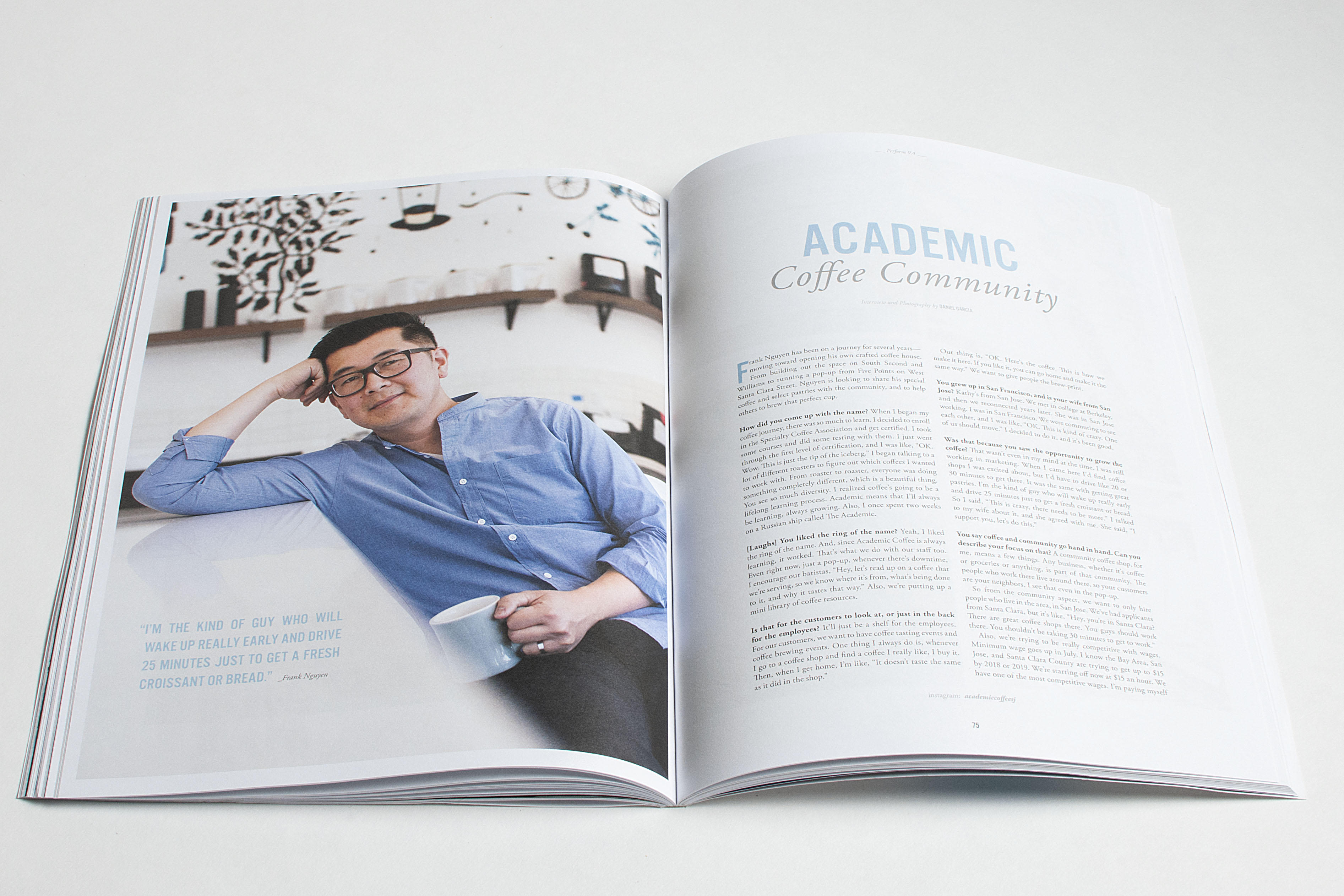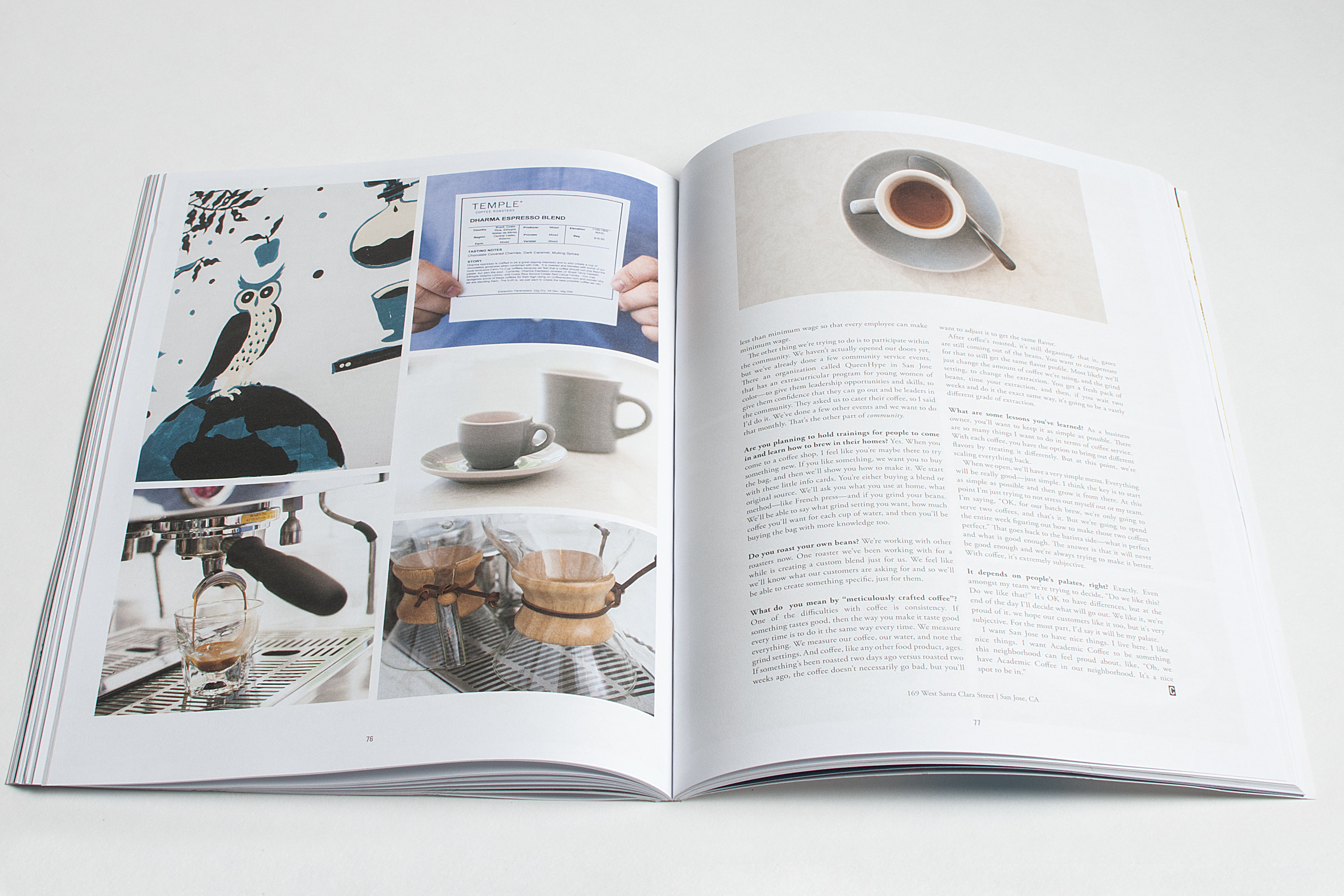
Frank Nguyen has been on a journey for several years, moving toward opening his own crafted coffee house. From building out the space on South Second and Williams to running a pop-up from Five Points on West Santa Clara Street, Nguyen is looking to share his special coffee and select pastries with the community—and to help others to brew that perfect cup. [Editor’s Note: Location on South Second Street opened August 2017.]
How did you come up with the name?
When I began my coffee journey, there was so much to learn. I decided to enroll in the Specialty Coffee Association and get certified. I took some courses and did some testing with them. I just went through the first level of certification, and I was like, “OK. Wow. This is just the tip of the iceberg.” I began talking to a lot of different roasters to figure out which coffees I wanted to work with. From roaster to roaster, everyone was doing something completely different, which is a beautiful thing. You see so much diversity. I realized coffee’s going to be a lifelong learning process. Academic means that I’ll always be learning, always growing. Also, I once spent two weeks on a Russian ship called The Academic.
[Laughs] You liked the ring of the name?
Yeah, I liked the ring of the name. And, since Academic Coffee is always learning, it worked. That’s what we do with our staff, too. Even right now, just a pop-up, whenever there’s downtime, I encourage our baristas, “Hey, let’s read up on a coffee that we’re serving, so we know where it’s from, what’s being done to it, and why it tastes that way.” Also, we’re putting up a mini-library of coffee resources.
Is that for the customers to look at, or just in the back for the employees?
It’ll just be a shelf for the employees. For our customers, we want to have coffee tasting events and coffee brewing events. One thing I always do is, whenever I go to a coffee shop and find a coffee I really like, I buy it. Then, when I get home, I’m like, “It doesn’t taste the same as it did in the shop.”
Our thing is, “OK. Here’s the coffee. This is how we make it here. If you like it, you can go home and make it the same way.” We want to give people the “brew-print.”
You grew up in San Francisco, and is your wife from San Jose?
Kathy’s from San Jose. We met in college at Berkeley, and then we reconnected years later. She was in San Jose working. I was in San Francisco. We were commuting to see each other, and I was like, “OK. This is kind of crazy. One of us should move.” I decided to do it, and it’s been good.
Was that because you saw the opportunity to grow the coffee?
That wasn’t even in my mind at the time. I was still working in marketing. When I came here, I’d find coffee shops I was excited about, but I’d have to drive like 20 or 30 minutes to get there. It was the same with getting great pastries. I’m the kind of guy who will wake up really early and drive 25 minutes just to get a fresh croissant or bread. So I said, “This is crazy, there needs to be more.” I talked to my wife about it, and she agreed with me. She said, “I support you, let’s do this.”
You say coffee and community go hand in hand. Can you describe your focus on that?
A community coffee shop, for me, means a few things. Any business, whether it’s coffee or groceries or anything, is part of that community. The people who work there live around there, so your customers are your neighbors. I see that even in the pop-up.
So from the community aspect, we want to only hire people who live in the area, in San Jose. We’ve had applicants from Santa Clara, but it’s like, “Hey, you’re in Santa Clara? There are great coffee shops there. You guys should work there. You shouldn’t be taking 30 minutes to get to work.”
Also, we’re trying to be really competitive with wages. Minimum wage goes up in July. I know the Bay Area, San Jose, and Santa Clara County are trying to get up to $15 by 2018 or 2019. We’re starting off now at $15 an hour. We have one of the most competitive wages. I’m paying myself less than minimum wage so that every employee can make minimum wage.
The other thing we’re trying to do is to participate within the community. We haven’t actually opened our doors yet, but we’ve already done a few community service events. There’s an organization called QueenHype in San Jose that has an extracurricular program for young women of color—to give them leadership opportunities and skills, to give them confidence that they can go out and be leaders in the community. They asked us to cater their coffee, so I said I’d do it. We’ve done a few other events, and we want to do that monthly. That’s the other part of community.
Are you planning to hold trainings for people to come in and learn how to brew in their homes?
Yes. When you come to a coffee shop, I feel like you’re maybe there to try something new. If you like something, we want you to buy the bag, and then we’ll show you how to make it. We start with these little info cards. You’re either buying a blend or original source. We’ll ask you what you use at home, what method—like French press—and if you grind your beans. We’ll be able to say what grind setting you want, how much coffee you’ll want for each cup of water, and then you’ll be buying the bag with more knowledge, too.

Do you roast your own beans?
We’re working with other roasters now. One roaster we’ve been working with for a while is creating a custom blend just for us. We feel like we’ll know what our customers are asking for, and so we’ll be able to create something specific, just for them.
What do you mean by “meticulously crafted coffee”?
One of the difficulties with coffee is consistency. If something tastes good, then the way you make it taste good every time is to do it the same way every time. We measure everything. We measure our coffee, our water, and note the grind settings. And coffee, like any other food product, ages. If something’s been roasted two days ago versus roasted two weeks ago, the coffee doesn’t necessarily go bad, but you’ll want to adjust it to get the same flavor.
After coffee’s roasted, it’s still degassing, that is, gases are still coming out of the beans. You want to compensate for that to still get the same flavor profile. Most likely, we’ll just change the amount of coffee we’re using, and the grind setting, to change the extraction. You get a fresh pack of beans, time your extraction, and then, if you wait two weeks and do it the exact same way, it’s going to be a vastly different grade of extraction.
What are some lessons you’ve learned?
As a business owner, you’ll want to keep it as simple as possible. There are so many things I want to do in terms of coffee service. With each coffee, you have the option to bring out different flavors by treating it differently. But at this point, we’re scaling everything back.
When we open, we’ll have a very simple menu. Everything will be really good—just simple. I think the key is to start as simple as possible and then grow it from there. At this point, I’m just trying to not stress myself out or my team. I’m saying, “OK, for our batch brew, we’re only going to serve two coffees, and that’s it. But we’re going to spend the entire week figuring out how to make those two coffees perfect.” That goes back to the barista side—what is perfect and what is good enough. The answer is that it will never be good enough, and we’re always trying to make it better. With coffee, it’s extremely subjective.
It depends on people’s palates, right?
Exactly. Even amongst my team, we’re trying to decide, “Do we like this? Do we like that?” It’s OK to have differences, but at the end of the day, I’ll decide what will go out. We like it, we’re proud of it, we hope our customers like it, too, but it’s very subjective. For the most part, I’d say it will be my palate.
I want San Jose to have nice things. I live here. I like nice things. I want Academic Coffee to be something this neighborhood can feel proud about, like, “Oh, we have Academic Coffee in our neighborhood. It’s a nice spot to be in.”
ACADEMIC COFFEE
499 S 2nd St
San Jose, CA 95113
instagram: academiccoffeesj
facebook: academiccoffee
This article originally appeared in Issue 9.4 “Perform”


